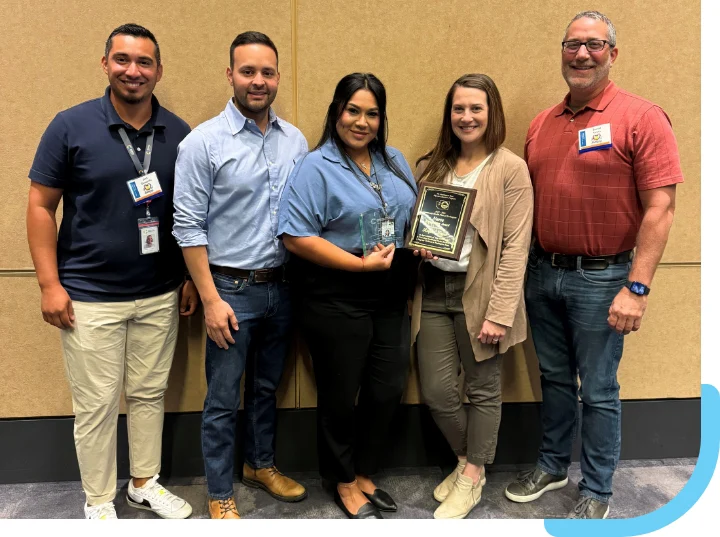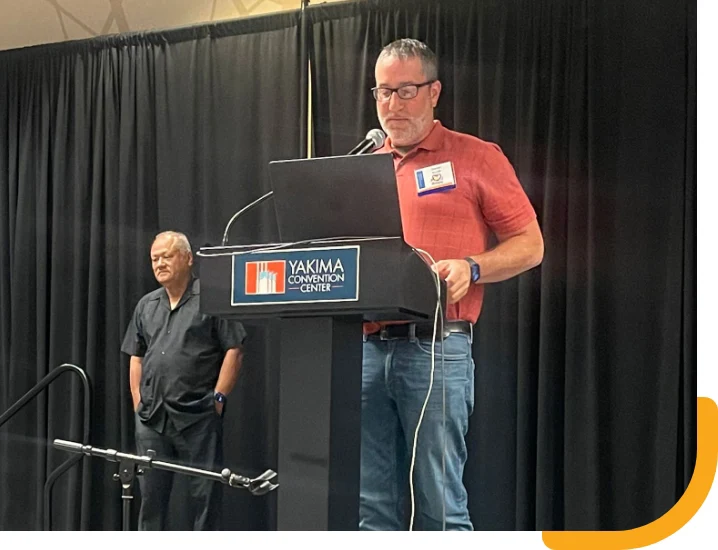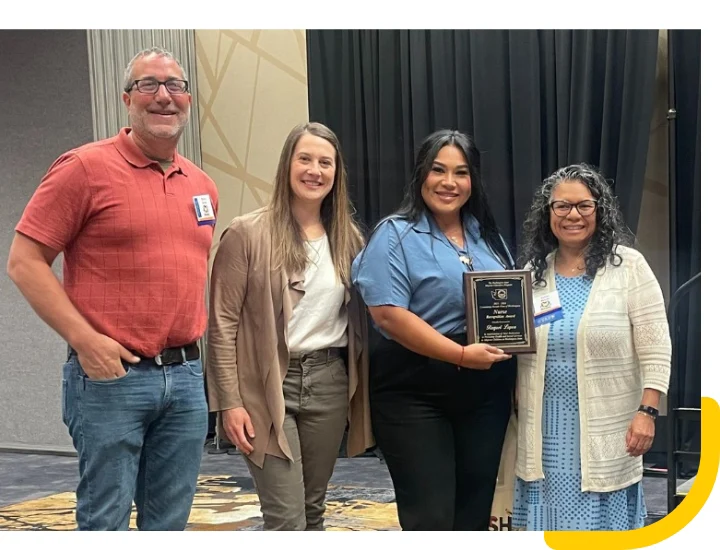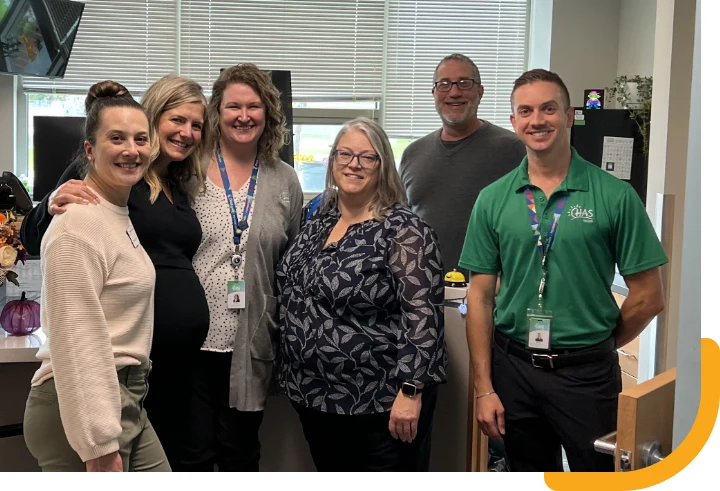Community Health Plan of Washington (CHPW) was founded in 1992 by Washington’s community health centers. CHPW is committed to Washington's health. To enroll in a Community Health Plan of Washington Apple Health (Medicaid), Medicare Advantage, or Individual & Family Cascade Select plan, you must be eligible and live in the service areas. This is not a complete description of benefits. Please contact us for more information.


2024 Annual Power of Community Report
Table of Contents
Supporting Access to Youth Health and Education

Access to health care, education, stable housing, and nutritious food significantly impact the health and well-being of all people, but especially young people as they are developing. In 2024, CHPW and our parent organization, Community Health Network of Washington (CHNW), deepened key partnerships across the state and participated in initiatives that directly address social factors affecting the long-term health of youth.
Strengthening ties to support migratory youth
CHPW’s partnership with the Washington Office of Superintendent of Public Instruction (OSPI) made major strides in 2024 as we expanded our work together to support migratory students. As the primary agency charged with overseeing public K–12 education in Washington State, OSPI works primarily through its nine regional Educational Service Districts (ESD) to provide funding and resources to the state’s schools and students, including four that serve approximately 14,000 migratory students annually through the Migrant Education Program (MEP).
As part of CHPW’s strategic initiatives with its network of Community Health Centers (CHCs) to improve support for youth and families, we have recognized the unique needs of migratory families and supported opportunities for students to achieve their fullest potential despite the challenges they face. Many of the families and youth that MEP serves move to these districts to obtain work in the agricultural or fishing industries. Due to the migratory nature of these jobs, youth often are unable to receive continuous, high-quality educational services. Aside from moving between school districts and states, cultural and language barriers, social isolation, disconnection from health care systems, and the lack of resources in areas where they live and work, are all barriers to wellness that migratory youth and families can face.
In 2024, our partnership with MEP expanded from working with one ESD to engaging with all four who serve these students and families. CHPW’s community-based outreach and K-12-focused teams have worked to develop their relationships with MEP, and engage directly with schools and families to ensure they have information and resources about accessing primary care, health insurance coverage, and educational supports. We’ve also worked at the state level to identify social and systemic challenges that interfere with these students’ healthy development and to advocate for addressing these barriers. Daniel Smith, Senior Regional Manager, overseeing our partnerships with the K-12 education and housing sectors explains, “We are grateful to the Office of Superintendent of Public Instruction as well as our network of providers for their strong commitment to improving access to health care services for those students and families who too often miss out on critical services, because of systemic barriers that we can together alleviate.”

CHPW's Josh Guajardo, Chelsea Stone, and Daniel Smith with Armando Isais-Garcia, MEP's Associate Director for Migrant Health and Out-of-School Youth, and award recipient Raquel at the Art of Belonging Conference.

We are grateful to the Office of Superintendent of Public Instruction as well as our network of providers for their strong commitment to improving access to health care services for those students and families who too often miss out on critical services, because of systemic barriers that we can together alleviate.
Daniel Smith
CHPW Senior Regional Manager

Collaborating with students and families

Chelsea Stone, Program Manager of our K-12 Strategy and Opportunity team, and Josh Guajardo, a Senior Account Manager for CHPW’s outreach team, were invited to present at the 2024 OSPI Migrant & Arts Education Programs State Conference, “Art of Belonging”, a result of their relationship-building with the school districts and communities MEP serves. CHPW was the first managed care organization to participate in the conference.
When asked how he and Stone came to speak at the conference, Guajardo said, “Through our work with migratory families, we heard there was a need to share our work with other people supporting them. It was an honor to be there, to directly answer questions that were relevant to their school districts, and to the families that they serve.” Participating in this conference serves as a milestone in CHPW’s partnership with MEP and their services offered across Washington State and demonstrates our commitment to being a trusted resource for Washington communities.
Stone and Guajardo’s session covered CHPW’s work with our CHCs in partnering with MEP statewide, strategies on engaging MEP students and families in discussions about health care, and the services, benefits, and support CHPW health plans offer families to live healthy lives. This annual conference is attended by a diverse group of individuals dedicated to supporting migratory students and their families, including educators, administrators, advocates, health professionals, and community partners.
Honoring excellence
Recognizing the challenges migratory students can face in engaging with the education system, CHPW was pleased to present several awards at the conference to honor two outstanding students and a school nurse from Washington State’s Migrant Education Program (MEP), at the OSPI Art of Belonging Conference.
Power of Community Perseverance Student Awards
CHPW’s Power of Community Perseverance Awards celebrate students’ remarkable dedication to learning, commitment to their communities, and persistence in overcoming challenges. We presented this award to two students at the conference.
The first award went to a standout student for his commitment to education and positive influence on his peers despite experiencing many obstacles. A $1,000 scholarship was awarded to celebrate the student’s devotion to pursuing future endeavors that will positively impact his community and his continued learning. After returning to the U.S. from Mexico for his senior year, the student faced the challenge of reintegrating into the American school system while being separated from his immediate family. Still, he maintained a 3.3 GPA, participated in varsity soccer, and engaged actively in his community. The student’s perseverance in finishing high school, determination to succeed, and involvement in extracurricular activities have made him a role model among his peers.
The second award honored a student’s determination to return to school while facing significant obstacles. A new laptop computer was awarded to support her goals to succeed in academics and prepare for her future. Prior to beginning school in Washington, she had been out of school for two years and did not speak English. Upon returning to school, this awardee earned the “Student of the Year” award at her high school and multiple “Student of the Month” awards. She actively participates in MEP-sponsored events and is committed to making up her credits and learning English. While she is preparing for her post-secondary education, she is determined to graduate and attend college.
“We are honored to hand out these awards to students who have exemplified perseverance and a commitment to learning, which in turn are emblematic of our work supporting social drivers of health, removing barriers to health, and keeping students engaged,” said Smith.

CHPW's Daniel Smith presenting the Power of Community Awards at the OSPI Art of Belonging Conference.

CHPW's Daniel Smith and Chelsea Stone with award recipient Raquel and OSPI MEP partner Sylvia Reyna, Director of Migrant Education.
Power of Community Nurse Recognition Award
The efforts of Raquel, a registered nurse, were recognized with the Power of Community Nurse Recognition Award. Raquel demonstrated exceptional leadership within the Migrant Education Health Program by significantly expanding the reach of support, services, and resources for MEP-eligible youth and families across multiple districts—reaching beyond her own region. As a strong advocate for student and family needs, she also played a key role in onboarding new nurses, demonstrating her advocacy methods, and sharing innovative ways to utilize MEP funds. This nurse modeled collaboration with basic educational nursing services and leveraged supplemental funds to introduce new initiatives, including mental health resources, which have now been replicated statewide. Smith, also in attendance at the conference, helped to present the awards.
Joining forces for health and wellness at school
In an effort to improve health and wellness innovations in the school systems, through school-based health centers (SBHCs) to remove barriers to routine care for families and K-12 students, we joined a new coalition formally established in the summer of 2024. Made up of CHPW, Community Health Centers (CHCs), the Washington School-Based Health Alliance (WA SBHA), Public Health-Seattle & King County, and the Washington Association for Community Health, the coalition aims to combine expertise, resources, and advocacy efforts to enhance training, technical assistance, and public policy across the state to improve school-based health and wellness programs.
SBHCs provide essential services at over 70 schools across the state. SBHCs conduct more than 12,000 visits across the state annually, offering services like sports physicals and well-child visits, behavioral health and substance use disorder treatment and support, specialty referrals and care coordination, dental care, insurance enrollment assistance, and parent engagement and education.

In its pilot year, the coalition collaborated on establishing a collective strategy to address under-resourced agencies and allocate additional resources as needed. The coalition also continued to reduce overlapping legislative efforts and align efforts to support SBHCs across the state.
Additionally, we worked with WA SBHA to identify capital and operational funding requests that were fully funded in the 2024 legislative session. This allowed eight SBHC projects to begin with eight different CHCs, and it allowed Washington State’s Department of Health (DOH) to continue their grant program to SBHCs across the state. The coalition will have an opportunity to share their work at the 2025 National School-Based Health Alliance conference in Washington D.C.


CHPW visits CHAS school-based health clinic located in Shadle High School, in Spokane, WA.

An SBHC and school team up to support a student in crisis
School-based health centers (SBHCs) can profoundly impact a student’s health and educational outcomes. Here is a story from a network Community Health Center (CHC) about the impact of teamwork between a school and their health center during a student health crisis.
A student, “Billy”, was navigating significant challenges at home and struggling with mental health issues. While at school one day, he attempted suicide. Once alerted by staff, the school’s SBHC team responded immediately. The on-site behavioral health provider worked with Billy to de-escalate the situation and ensured his safety until emergency services arrived.
This coordinated response by the school and SBHC staff, including school nurse and SBHC counselor, were crucial in connecting Billy to timely support.
After receiving the care he needed in the days that followed, Billy returned to school and began regular appointments with both the school-based health center’s behavioral health provider and primary care provider. With ongoing support, Billy got back on track to graduate. He now has a desire to become a health care worker to support other young people facing similar challenges.
This story highlights the importance of strong partnerships between schools and SBHCs, and the difference this collaboration has on student health and education.

- CUSTOMER SERVICE
- 1-800-440-1561
- (TTY: 711)
- [email protected]

- ADDRESS
- 1111 Third Ave
- Suite 400
- Seattle, WA 98101

- HOURS
- 8 a.m. to 5 p.m.
- Monday to Friday